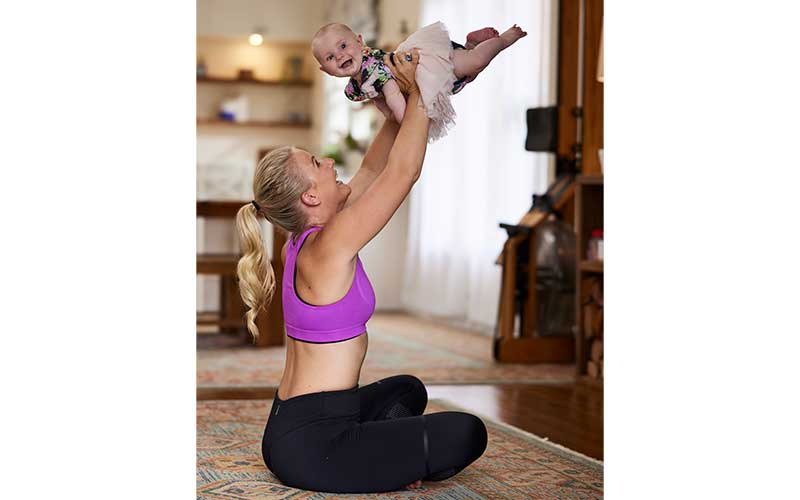Breastfeeding and weight loss with WeightWatchers®


Your questions about WeightWatchers and breastfeeding answered
Having a baby and breastfeeding can be a big change, both physically and mentally. It’s not uncommon for you to feel confused and overwhelmed about the conflicting advice received while breastfeeding. How much should you eat? What should you avoid? How might your diet affect your baby?
Whether your goal is to lose weight while breastfeeding, or just general wellbeing, you’re in the right place. We’ve created your ‘go-to guide’ to help you reach your post-partum goals with WeightWatchers.
For food inspiration, we’ve compiled an easy-to-follow meal plan. This meal plan is science-based, safe for breastfeeding mums and are customisable for both exclusive and partial breastfeeding.
And because we know it can be difficult juggling parenthood and self-care, in this guide we’ve also included techniques for exercise, sleep and mindset that are specifically tailored for busy mums.
We’re here to help you build healthy habits that will take you through your breastfeeding journey and beyond. So let’s get started! If you're not a member, you can join WeightWatchers today and get your personalised Points Budget that will guide you towards healthy and sustainable weight loss while breastfeeding.
Your body post-pregnancy
Your body goes through some pretty radical changes in pregnancy, and these don’t go away overnight. Breastfeeding may help you lose weight, but it’s not a magic fix. You need to give yourself time to get back to your pre-pregnancy shape. Focus on healthy habits. Try not to compare yourself to celebrities on social media. It took nine months to make your baby and it can take several months to get back to your pre-pregnancy weight after the birth.
Reaching a healthy weight after pregnancy will improve your long term health and reduces health risks to both mum and baby in future pregnancies. Many new mums may want to jump straight into losing their baby weight, however there are things to consider to help keep you and your baby happy and healthy during this time:
- Be sure to get the go-ahead from your doctor or health care professional before you begin trying to lose weight after your baby is born.
- Nursing mums can commence the program no earlier than 2 months post childbirth.
- The recommended rate of weight loss for nursing mums is no more than 2kg per month. This may not sound like much but try to be patient; the program is designed to deliver a healthy and safe level of weight loss.
Breastfeeding and nutrition: Your Points Budget explained
When breastfeeding, your body uses a lot of energy. This means you may feel hungry, thirsty and tired and you may need to eat more food or drink more water to keep up with what your body needs. The types of foods you eat are also important and are explained more later in this article.
The Points Program offers customised food plans that are tailored for breastfeeding women. The program has been specifically designed to offer an adjusted Points budget to ensure your food intake that supports you and your baby's nutrition needs.
How does WeightWatchers work for breastfeeding mums?
If you’re in weight loss mode while breastfeeding, the recommended rate of weight loss is no more than 2kg per month. To accommodate this healthy rate of weight loss, if you tell us that you’re breastfeeding at sign up or update your Food Settings (Profile > Settings > Food Settings > Are you nursing?), we will automatically adjust your Budget to take into account the additional calories (kilojoules) you require when you’re breastfeeding.
If you’re breastfeeding multiple babies, you’ll need to add additional Points to your daily Budget manually. Here’s how:
- If breast milk is the sole source of nutrition for your babies, add 16 Points for each baby.
- If breast milk is a partial source of nutrition for your babies, add 6 Points for each baby.
What is the best diet for breastfeeding mothers?
The best diet for breastfeeding mothers is one that isn’t restrictive, but has a variety of foods and meets your energy needs.
Eating a wide variety of foods across all core food groups will help to ensure you and your baby are meeting your nutrition requirements to remain healthy while breastfeeding. These food groups include:
- Vegetables
- Fruit
- Grains (cereal) foods
- Leans meats and poultry, fish, eggs, tofu, nuts and seeds and legumes/beans
- Milk, yoghurt, cheese and/or alternatives, mostly reduced fat
It is also important to stay hydrated by drinking plenty of fluids, particularly water. Our body uses extra fluid to make breastmilk, so aim to have at least 8 cups of fluid per day, and increase your intake during warmer months.
Tip: Use the ‘water tracker’ feature in the app to help you stay hydrated!
Why is a healthy diet important while breastfeeding?
As well as using a lot of energy while breastfeeding, you may also need extra nutrients. This is because your body is working hard to make breast milk and prioritises your baby’s needs.
Your diet won’t directly affect the quality or quantity of your breast milk, but extreme restrictive diets may affect milk supply and cause vitamin and mineral deficiencies. This means it is important to eat a healthy and balanced diet.
Are there foods to avoid while breastfeeding?
There are no foods you need to avoid while breastfeeding, however it is recommended to limit caffeine to 200mg or less per day (eg. 2-3 cups of instant coffee or tea). When it comes to alcohol, the safest option is to avoid drinking altogether when breastfeeding.
What about breastfeeding supplements?
Iodine is an essential mineral used to make important hormones. As we are making more of these hormones while breastfeeding, our iodine requirements increase. It is difficult to get the amount of iodine our body needs from food alone, so it is recommended to supplement with 150mg of Iodine while breastfeeding.
If you have any questions or concerns, please check with your doctor or health care professional.
Breastfeeding meal plan
This dietitian-created meal plan can used throughout your breastfeeding journey. It includes a variety of nutritious foods designed to meet the additional energy requirements for breastfeeding mothers.
Breastfeeding and exercise guidelines

Exercising and staying active while breastfeeding is important for your overall health and wellbeing. It can improve your mood and mental health as well as keep you fit and strong, and help you achieve and maintain a healthy weight.
However, it is important you check in with your doctor or health care professional before reintroducing any old or new exercise to avoid any potential injuries. It took you 9 months to form your pregnancy body, it will take time to return to your pre-pregnancy self! Recovery may also take longer after a cesarean.
When you get the A-OK from your doctor or health care professional, introduce exercise slowly - don’t rush back to your pre-pregnancy routine. Take time to rest and have some self-compassion.
When you’re ready, it’s a good idea to find exercises that help strengthen your core muscles and in particular, your pelvic floor. Exercises that can help strengthen your core floor are included in our mum and baby workout.
Lacking time?
Try and divide your exercise into smaller, more manageable blocks per day, for example ~30 minutes per day or 2 x 15 minute blocks while your baby sleeps. Alternatively, you can incorporate your baby into the workout (see our mum and baby workout above).
This can be helpful when aiming for 2 ½ hours of moderate intensity activity (such as a fast walk or dance class) per week.
Breastfeeding and mindset
Mindset shifting
Shifting your mindset can help you create healthy habits and reach your health and wellness goals. Unhelpful thoughts could derail you, while a helpful inner dialogue could propel you forward, giving you the power to say “I’ve got this” in the face of a challenge.
Use these techniques to help you change your unhelpful thoughts into helpful thoughts that will help you achieve your health goals:
| UNHELPFUL THOUGHTS | HELPFUL THOUGHTS |
| This is too hard | I can take on challenges |
| I want to give up | I will keep trying |
| I made a mistake | Mistakes help me learn |
| Plan A didn’t work | The alphabet has 25 more letters! |
| I’m not good enough | I can always improve. I’ve got this! |
Self compassion and learning to love your post-baby body
Having a baby is a huge change, both physically and emotionally. It's important to be supportive and understanding of yourself when moving towards your health goals. Why? Because self criticism doesn't work. What does? Being kind to yourself and celebrating what your body can do.
Show your body some love - take a self-compassion break:
- Find a quiet place to reflect while your baby is sleeping or feeding.
- Take some deep breaths and then think of all the amazing things your body can do.
- Let go of any judgement and negative thoughts.
Stress and mindfulness
“Stop! Close your eyes for a moment and take three deep breaths”
It’s normal for new mums to feel stressed sometimes. Coping with the demands of a baby and everything that’s going on around you can feel overwhelming.
Too much stress can affect your milk production and can also make it difficult to bond with and care for your baby. The good news is the hormones that are released during breastfeeding can encourage positive feelings of relaxation, love, bonding and may aid in negating everyday stress.
You can also try meditation, yoga, relaxation techniques and deep breathing exercises to reduce the stress levels.
Breastfeeding and sleep

Having a new baby can be an exhausting time for new parents. It is recommended that adults get 7-9 hours sleep a night however research has shown that most parents of children aren’t getting enough sleep.
Maternal sleep is important for overall mental and physical health. Lack of sleep can negatively affect your immunity, cognitive ability, mental health and relationships. Sleep loss has also been shown to result in metabolic and hormonal changes which can make it harder to reach your weight loss goals.
How to cope with broken sleep
- The old adage ‘sleep when your baby sleeps’ exists for a reason! Try to catch up on sleep when your baby is sleeping in the daytime. It might be hard to ignore the other household chores, but you need to prioritise sleep.
- Share the overnight feeds with your partner via expressed breast milk or formula.
- Take comfort in knowing that this isn’t a long-term issue. Most babies are sleeping nine to twelve hours at a time at night by six months.
Additional frequently asked questions
What does ‘partially breastfeeding’ mean?
Partially breastfeeding means you have started to wean your baby to consume formula and/or eat food. Once weaning is complete, the daily Points budget should be reset to that of a non-breastfeeding woman. If you have any concerns whether you are getting the right amount of energy for your stage of breastfeeding, speak to your doctor.
Can I use Points leftover at the end of the day?
Yes! With each plan you can rollover up to 4 unused daily Points into your Weekly Points budget. Rollover Points will be reset on weigh-in day each week.
How do I get the correct Points budget whilst breastfeeding on my app?
iPhone and Android: From the My Day screen > Profile icon (top right) > Gear icon (top right) > Food Settings > Are you breastfeeding? > Select either "I am breastfeeding" or "I am partially breastfeeding".
Computer: Click on Account at top right > Settings > In the 'Breastfeeding' section check the most appropriate option > scroll down and click Update.
NOTE: Once you have finished breastfeeding, you will need to update your settings to ensure your daily Points are reset to that of a woman who isn’t breastfeeding.